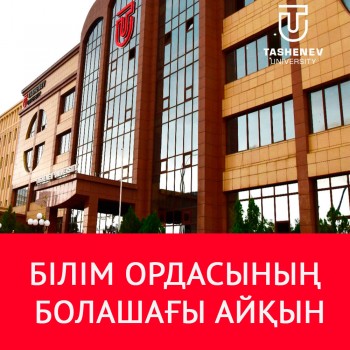A clear future for an educational institution
- 230 views
The development and prosperity of modern society is determined by the quality of educational activities and its organization, based on the effectiveness of the practical application of the results of scientific research, the safety of life and the nation, the development of science, educational activities and science, recognized by many at the modern world level, is one of the spiritual values of mankind.
Zh.A. Tashenev University is one of the basic educational institutions. The mission (main position) of the university is the coordination of educational activities and science, which is the basis for the rapid development of society. In this regard, the university is an example for others in education, in the field of science and education, in providing freedom to realize the achievements of innovative, personal research, in making a significant contribution to the development of the state and society, and in educating the younger generation.
Department of "Philology" of the University named after Zh.A. Tasheneva, guided by educational programs and concepts, innovatively provides quality education and conscious education of students. Whatever the profession, whatever the profession, its essence is explained through language. Considering that language is an expression of thought, when explaining to students the basics of knowledge in any field, it is necessary to have a rich vocabulary of specialists and the linguistic richness necessary to reveal the intricacies of this profession.
Continuing the traditions of classical universities, the department constantly focuses on the high level of educational activities of the university and the development of the basics of applied knowledge. Language is the basis of life. There is no society without language. The main advantage of the language specialty over other specialties is that it provides enough space for students' creative freedom. The student is given the opportunity to form his own opinion and conclusions by comparing the results of the study, not relying only on memorized principles. This is the perfect introduction to self-knowledge.
That is why professors and teachers of our department focus on a deep understanding of the basics of the language. Bachelors in five specialties of the department:
6B01701-Training of teachers of the Kazakh language and literature
6В01702- Training of teachers of the Russian language and literature
6В01703-Foreign language: training of teachers of two foreign languages
6B01704-Training of teachers of the Uzbek language
6B032010-Librarianship
Masters in two specialties:
7M01701- Training of teachers of the Kazakh language and literature
7M01702- Foreign language: training of teachers of two foreign languages
prepared by experts.
In the 2023-24 academic year, the department of "Philology" will have a teaching staff.
The mission (main position) of the department is to ensure the qualitative economic prosperity of modern society, the quality of life, national security is determined by the state of education, the development of science, the effectiveness of applying the results of scientific research in practice.
The Department of Philology has many opportunities for conducting theoretical education in accordance with modern requirements, on the basis of state documents, in connection with the achievements of pedagogical and psychological research, and best practices. The teachers of the department are guided by the main provisions in the content of education and training. This content includes the following:
1. Students should be able to master the content of educational programs of language classes (Kazakh, Russian, foreign languages) and the amount of knowledge provided for each course. Ability to analyze the educational program and its requirements.
2. Be able to analyze the content and structure of subject textbooks for language classes (Kazakh-Russian foreign language), their suitability for level training of students, the structure and content of questions and tasks given in the textbooks.
3. Analysis of the types of lessons and the structure of the lesson in connection with this.
4. Justify the educational, educational, developmental goal of the lesson based on its topic and content.
5. Make and work out a language lesson plan (Kazakh Russian foreign language) based on the types, topics and goals.
6. Be able to analyze the types of independent work of students during the lesson, depending on the topic of the lesson.
7. Systematization of extracurricular activities by topics and chapters.
8. Differentiate the techniques and techniques used in the lesson, depending on the content and purpose of the topic.
9. Teaching ways to develop the creativity of educators.
10. Master the methods of organizing educational work and draw up a plan for it.
11. Ability to analyze the methods of integrated teaching of subject content.
12. The ability to differentiate the knowledge given to educators into mandatory and possible levels.
13. Ability to analyze the quality of education, knowledge and skills provided to students.
At present, in the context of the significance of integration processes in science and the education system, the importance of the dialectical unity of knowledge and the reconstruction of reality is increasing. In modern scientific literature, there are various interpretations of the concept of knowledge. According to some researchers, scientific concepts and concepts are not born from experience, first a plan is drawn up, predictions are made, supported by theory, and then it is tested in practice.
The teacher's knowledge begins with school life and is directly related to reading fiction, acquiring documentary scientific knowledge, watching movies, as well as knowledge gained at the institute, and with conditions that are influenced by the environment and learning outcomes. Systematically organized training is the only way for a teacher to expand their knowledge, apply previously acquired knowledge and experience to professional skills.
Collective solidarity and harmony have been firmly established at the Department of Philology. Experienced teachers regularly provide methodological assistance to young teachers. Thanks to this, when organizing the department, events, debates, literary evenings dedicated to the work of poets and writers are regularly held.
Mamyt Amangeldy - Dean of the Faculty of Pedagogy and Philology, Ph.D.
Kalybekov Bolat Ermekulyt - senior lecturer of the department "Philology", Ph.D.

